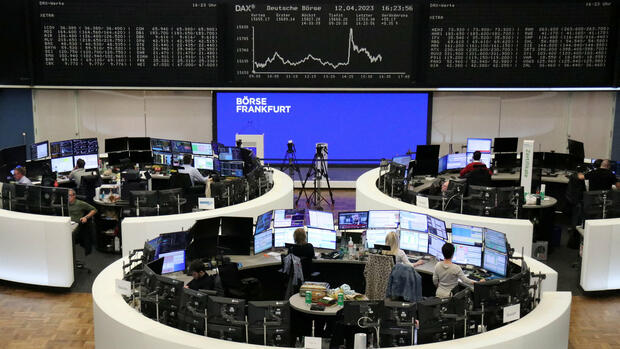Germany’s most important listed companies see geopolitical developments, inflation and cyber incidents as risks to their business
(Photo: Reuters)
Dusseldorf
Germany’s most important listed companies see geopolitical developments, inflation and cyber incidents as risks to their business. This is followed by production and delivery bottlenecks and regulatory risks. At least around three quarters of the companies listed in the Dax, MDax and SDax indices identify these factors as a risk.
This is the result of a scientific analysis by the communication consultancy Crunchtime in cooperation with the University of Hohenheim in Stuttgart. She looks at the risks companies are dealing with and how they deal with them in the latest annual reports. The study is exclusively available to the Handelsblatt in advance.
For the first time, the Crunchtime risk monitor evaluates risk reports and forewords from the board of directors from the annual reports of listed companies. 151 out of 160 reports published by companies included in the leading index Dax, the second-tier index MDax and the small-caps index SDax between the beginning of February and the end of April 2023 were analyzed.
Geopolitical impacts top the list, accounting for 83 percent of the threats addressed in risk reports. Inflation and cyber incidents follow closely behind at 79 percent each. Remarkable: Only about every second company in the entire sample names climate change as a risk factor.
“German companies have benefited from globalization for a long time. Now the other side of the coin is showing,” says Frank Brettschneider, Professor of Communication Science and responsible for the risk monitor analysis at the University of Hohenheim.
He refers to the concerns about geopolitical developments and explains: “There are risks associated with this, such as production and supply bottlenecks.” The decisive drivers for the assessment of the companies are obvious: the Ukraine war and the conflicts between the USA and China.
Accordingly, the CEOs of the Dax family also mention geopolitics in the forewords to the annual reports – as a risk over which they themselves have little influence. At the same time, according to the study, board members are reluctant to address dangers that they could control themselves.
Conti CEO does not address cyber attacks in the letter to the board
The most impressive example: Cyber threats share second place in the risk assessment. But while geopolitics (34 percent) and inflation (23 percent) are the top themes in the speeches, cyber threats are almost non-existent.
Only one percent of the 151 CEOs – exactly two – address cyber incidents accordingly. Johannes Fischer, Managing Director of Crunchtime, rates this small response as “surprising”: “Statistically, around 50 percent of companies fall victim to cyber attacks every year, which pose a significant risk to reputation and business.”
One cannot deduce from the reluctance in the foreword by the Management Board that the enormous damage potential of cyber crises is not seen. However, in public positioning, board members would try “not to associate themselves too closely with crisis issues in the immediate corporate environment,” says Fischer.
The head of the Dax group Continental, Nikolai Setzer, does not address cyber risks in his letter to the board. And this despite the fact that Conti was the target of a large-scale cyber attack in 2022. Criminals stole 40 terabytes of data from the car supplier. Conti’s risk report, on the other hand, explicitly addresses the attack and future IT risks.
>> Read also: The big China risk – some Dax companies could hardly cope with conflicts like with Russia
The wind power company Nordex, which was the target of a cyber attack in 2022, takes a different approach: CEO José Luis Blanco now takes up the incident in his letter to the board.
According to the survey, groups from the energy/raw materials, trade/consumer, mechanical engineering, transport and logistics sectors are the most sensitive to geopolitical risks. More than 90 percent of the companies analyzed in these sectors name this danger – they are once again significantly above the average of 83 percent in the entire sample.
The fear of production and delivery bottlenecks is also higher in these sectors than the average for all companies (79 percent). According to the study, financial companies are the least sensitive to risks in their reports. In particular, they address cyber risks far less than danger – only 53 percent address them at all.
More: Criminals are launching more and more cyber attacks on banks


